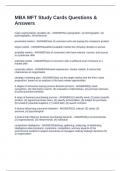MBA MFT Study Cards Questions &
Answers
major segmentation variables (4) - ANSWERS(1) geographic, (2) demographic, (3)
psychographic, (4) behavioral
penetrated market - ANSWERSset of customers who are buying the company's product
target market - ANSWERSqualified available market the company decides to pursue
available market - ANSWERSset of consumers who have interest, income, and access
to a particular offer
potential market - ANSWERSset of consumer with a sufficient level of interest in a
market offer
corporate culture - ANSWERSshared experiences, stories, beliefs, & norms that
characterize an organization
strategic marketing plan - ANSWERSlays out the target market and the firm's value
proposition, based on an analysis of the best market opportunities
5 stages of consumer buying process decision process - ANSWERS(1) need
recognition, (2) information search, (3) evaluation of alternatives, (4) purchase decision,
(5) post-purchase behavior
8 steps of business purchasing process - ANSWERS(1) identify need, (2) select specific
product, (3) appoint purchase team, (4) specify technicalities, (5) budget for purchase,
(6) research potential suppliers, (7) solicit bids, (8) award contracts
4 factors influencing consumer behavior - ANSWERS(1) cultural, (2) social, (3)
personal, (4) psychological
4 factors that influence business purchasing behavior - ANSWERS(1) environmental,
(2) organizational, (3) interpersonal, (4) individual
competitive intelligence - ANSWERSdefining, gathering, analyzing, & distributing
intelligence about products, customers, competitors, and any aspects of the
environment needed to support executives & managers making strategic decisions for
an organization
,managerial decision making process steps (6) - ANSWERS(1) establish the objective,
(2) define the problem, (3) identify possible solutions, (4) evaluate alternative courses of
action, (5) implement the decision, (6) acquire feedback
8 major models of marketing communication - ANSWERS(1) advertising, (2) sales
promotion, (3) events & experiences, (4) public relations & publicity, (5) direct
marketing, (6) interactive marketing, (7) word-of-mouth marketing, (8) personal selling
pull strategy - ANSWERSthe manufacturer uses advertising and other communication
to persuade consumers to demand the product from intermediaries, thus inducing
intermediaries to order it
push strategy - ANSWERSuses the manufacturer's sales force, trade promotion money,
or other means to induce intermediaries to carry, promote, & sell the product to end
users
points-of-parity (POPs) - ANSWERSattributes or benefit associations that are not
necessarily unique to the brand but may be shared with other brands
points-of-difference (PODs) - ANSWERSattributes of benefits that consumers strongly
associate with a brand, positively evaluate, and believe they could NOT find to the same
extent with a competitive brand
posititioning - ANSWERSthe act of designing a company's offering and image to occupy
a distinctive place in the minds of the target market
supersegment - ANSWERSset of segments sharing some exploitable similarity
5 key criteria market segments must rate favorably on to be useful - ANSWERS(1)
measurable, (2) sustainable, (3) accessible, (4) differentiable, (5) actionable
pyschographic - ANSWERSthe science of using psychology & demographics to better
understand consumers
variables of demographic segmentation (6) - ANSWERS(1) age and life-cycle stage, (2)
life stage, (3) gender, (4) income, (5) generation, (6) race & culture
investment banking - ANSWERSa specific division of banking related to the creation of
capital for other companies, governments, and entities
weak form - ANSWERSassumes that all info contained in past price movements is
reflected in the current market price. info about recent trends in a stock price is no use
in selecting a stock
semi-strong form - ANSWERSstates the current market price reflects all publicly
available information. to gain abnormal returns insider info is needed
, information efficiency - ANSWERSall relevant information about a stock is reflected in
its price (this is in a perfect world)
strong form efficient - ANSWERSall info -- public and insider -- is reflected in the market
price. no abnormal returns
market efficiency - ANSWERSthe degree to which stock prices reflect all available
relevant information
money market - ANSWERSa segment of the financial market in which financial
instruments with high liquidity and very short maturities are traded
capital markets - ANSWERSmarkets for buying and selling equity and debt instruments
security - ANSWERSa financial instrument that represents an ownership in a publicly-
traded corporation (stock), a creditor relationship with governmental body or corporation
(bond) or rights to an ownership as represented by an option
most common underlying assets of derivatives - ANSWERSstocks, bonds,
commodities, currencies, interest rates, market indexes
derivative - ANSWERSa security with a price that is dependent upon or derived from
one or more underlying assets. its value is determined by fluctuations in the underlying
assets
futures - ANSWERSfinancial contracts obligating the buyer to purchase an asset (or the
seller to sell an asset) at a predetermined future date and price
option - ANSWERSa financial derivative that represents a contract sold by one party
(option writer) to another party (option holder). the contract offers the buyer the right to
call or put a security at an agreed upon price (strike price) during a certain period of
time or on the exercise date
2 types of financial instruments - ANSWERS(1) cash instruments, (2) derivative
instruments
financial instruments - ANSWERSassets that can be traded
INVENTORY TURNOVER = - ANSWERSSALES/INVENTORY
AVERAGE COLLECTION PERIOD = - ANSWERSDAYS (ACCOUNTS
RECEIVABLE)/CREDIT SALES
WORKING CAPITAL RATIO= - ANSWERSCURRENT ASSETS/CURRENT
LIABILITIES




